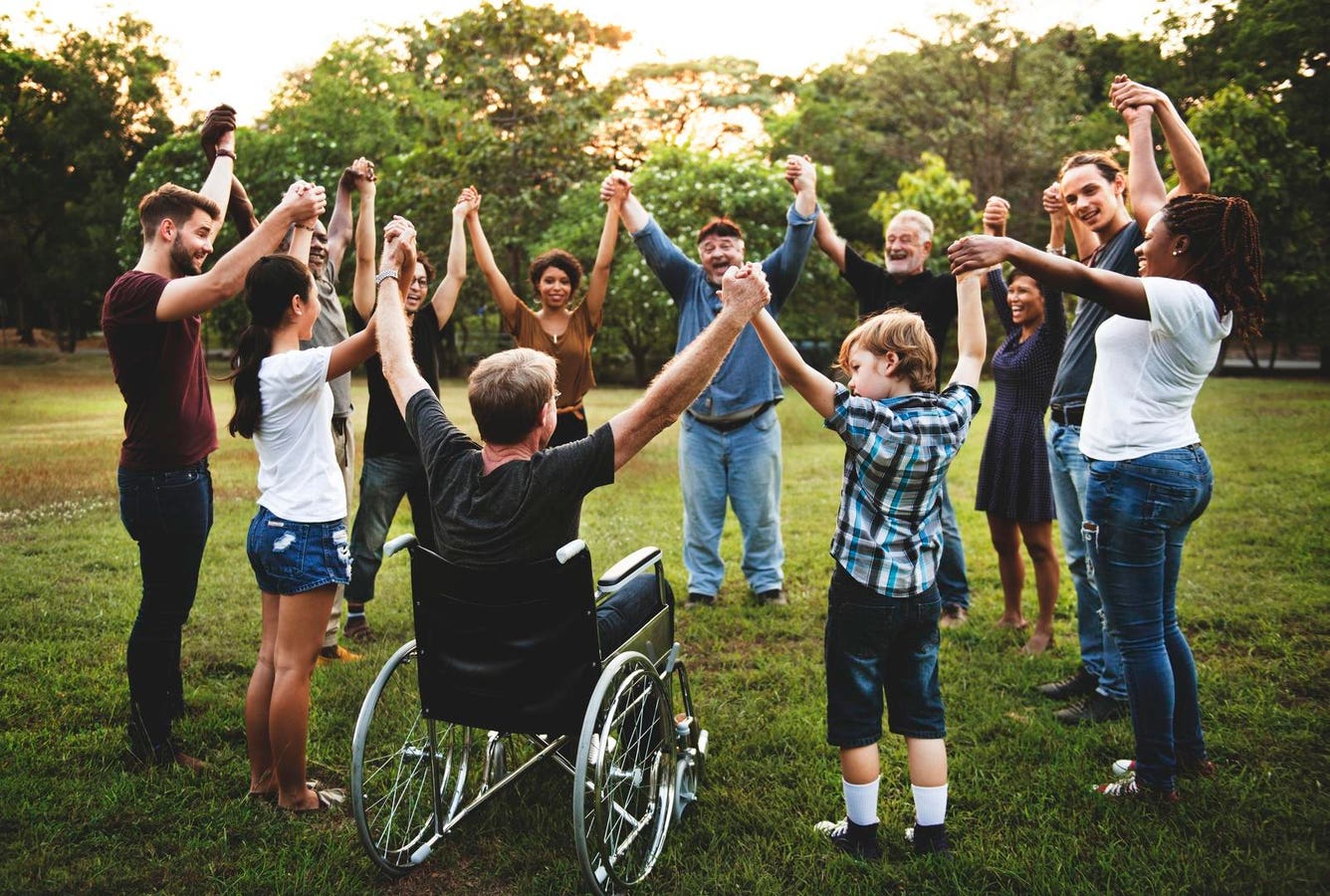Group of people holding hand together in the park
“It did not get easier; it just got different,” said Dr. Christina Wyman, a USA Today bestselling author and teacher living in Michigan, who experienced the devastating effects of chronic loneliness for five years. “Most of my evenings and weekends were spent alone, filled with a silence that echoed within my ears, in my throat, and deep into my chest,” she shared.
According to a new report from the UN World Health Organization (WHO), one in six people experience loneliness, a reality with serious implications for health and well-being. Loneliness has become a pressing public health concern, threatening our quality of life, safety, and even our environment. Among older adults, loneliness and social isolation are recognized as top issues in aging. A 2025 study by the Alliance for Health Policy revealed that mental health challenges and isolation are pervasive among this population—often stemming from loss, chronic pain, and systemic neglect.
So, how do we reduce feelings of loneliness, particularly among vulnerable older adults and others at risk? The answer is complex. Loneliness is a deeply human experience—multifaceted, unique, and shaped by personal history. Perhaps, instead of trying to “cure” loneliness, the solution lies in learning to embrace it, even as we work to ease its effects—especially in chronic cases.
Dutch priest and theologian Henri Nouwen once wrote that, “The best of community does give one a deep sense of belonging and well-being; and in that sense, community takes away loneliness.” A wealth of research supports this—community can help reduce loneliness. But not just any community will do. What we truly need is a sense of belonging—spaces where we feel safe, respected, and valued.
Take older caregivers, for instance. Loneliness can be acute or chronic. But access to support groups, intentional friendships, or local resources—such as respite care services or adult day programs—can ease the burden. Even if loneliness persists, these supports can make a painful situation more bearable.
Dr. Kayse Maass, an industrial engineer who leads the Operations Research and Social Justice Lab at Northeastern University, put it plainly: “What we often need is community care […] but we also need to design our systems and communities so people have space to live healthy lifestyles.” Advancing community care demands a foundational shift toward empathy—a cultural framework that affirms each individual’s worth, dignity, and need for connection.
Older women playing board game in a retirement home.
While systemic change is crucial, we also hold personal power. There are meaningful ways to embrace and work through loneliness, regardless of age or circumstance. Here are a few:
1. Find An Intentional Community
Start small. Volunteer at a local thrift store. Chat with staff at your neighborhood coffee shop. Attend a book club, faith group, or fitness class. Even if you’re not ready to participate, being present at trivia nights, karaoke events, or support groups can offer a sense of connection. The key is to seek out communities that align with your interests and values. Lastly, stay open to forming friendships across all ages—you never know who might become a meaningful connection.
2. Build Resilience To Loneliness
There will be times when others aren’t available. So, how do we cope? Engage in self-care practices: take walks, spend time in nature, try crafts, journal, or meditate. Pursue activities that bring joy or offer a sense of purpose. Speaking with a mental health professional can also help—both to navigate your circumstances and to determine whether loneliness might be linked to conditions like depression or social anxiety. Still, it’s important to remember: building resilience doesn’t erase systemic barriers. Privilege plays a significant role in shaping who has access to resources and support.
3. Acknowledge Your True Self
Are you more introverted, extroverted, or somewhere in between? Do you thrive in solitude, or are you energized by connection? Would moving closer to friends and loved ones improve your well-being? Reflecting on your social needs and relationship values can guide you toward deeper, more meaningful connections. Dr. Wyman shared, “The lack of community I endured during this time became unsustainable. Less than a year before the pandemic took hold, I left my professional life and moved back in with Matt (her fiancé). I’d always been on the fast track toward a career. But in the end, the need for intimate human connection outweighed the promise of professional opportunity. […] If not for my relationship, I’m confident I would have left the country in search of other cultures.” She isn’t alone. Deep down, we all yearn for closeness, companionship, and the comfort of belonging.
4. Fight The Stigma Of Loneliness
Embracing loneliness begins with confronting the stigma that surrounds it. It means reminding ourselves—and each other—that feeling lonely is a natural part of being human. When we accept this truth and integrate it into our thinking, we can begin to shift how we approach loneliness, both personally and collectively. People may feel less ashamed to speak openly and less afraid of being judged for their experiences. Ultimately, it’s about being present with our reality, acknowledging our feelings without shame, and seeking out safe spaces where we can share our stories and be heard.
Volunteers sitting outdoors wearing warm casual clothing on a sunny cold winters day. They are … More
Chronic or lifelong loneliness is no small matter. It can take a profound toll on both emotional and physical health. And for many, progress may come slowly—if at all—depending on their circumstances. But any progress is still meaningful, even if that progress is learning to sit with loneliness, to understand it, and to embrace it gently.
As Nouwen put it: “The question is whether we let our aloneness become loneliness, or whether we allow it to lead us into solitude. Loneliness is painful; solitude is peaceful. […] It requires conscious choices about whom to be with, what to study, how to pray (or meditate), and when to ask for counsel.” His words remind us that by facing our loneliness, we can transform it into solitude—a peaceful space where we rediscover intimacy with ourselves and forge more authentic connections with others.
Embracing loneliness (rather than fearing it) doesn’t mean staying in the same place emotionally or in society. It’s about accepting ourselves, practicing self-compassion, and finding hope in challenging situations. At the very least, it may help us discover new ways of empathizing and relating to each other.









